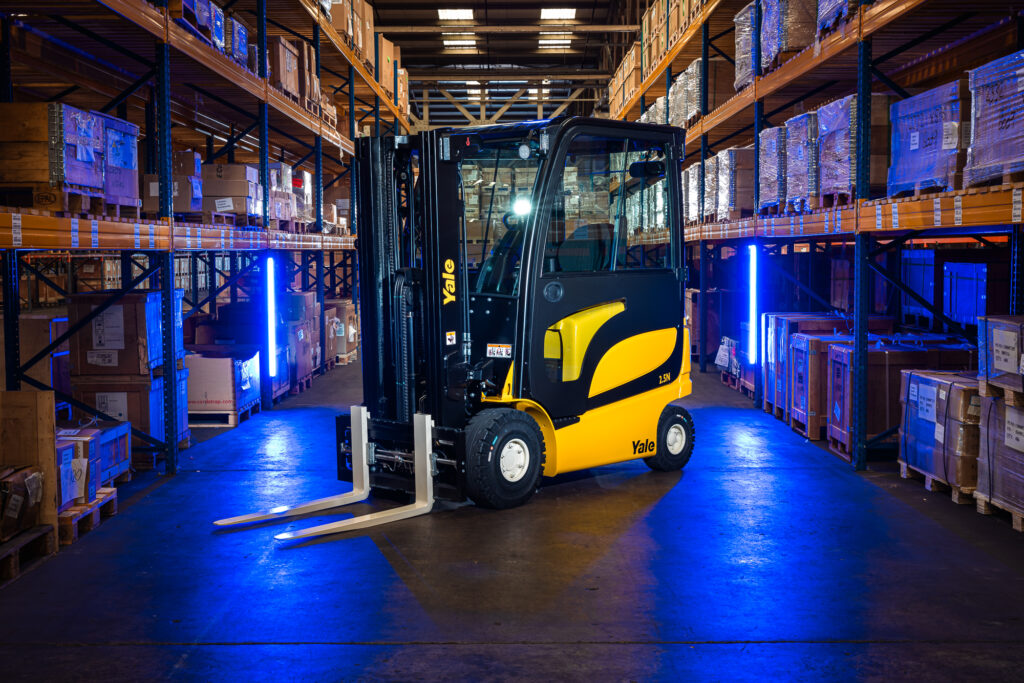New Electric Series Forklift Introduced
28th May 2025

Yale Lift Truck Technologies introduces the new ERP2.2-3.5N electric lift truck series, designed to help warehouses optimise efficiency and flexibility with the power of battery electric forklifts. With a versatile range of optional features, the Series N forklifts can lift up to 3.5 tonnes, delivering the performance and flexibility to meet specific operational needs.
“The new Yale® Series N electric forklift is built on a foundation of proven performance, delivering the reliability that warehouses will recognise from Yale, but reinvented for the challenges of today’s dynamic operations,” says Fraser Brash, Regional Product Manager, for Yale Lift Truck Technologies. “In its standard configuration, the new Yale Series N electric lift trucks enhance productivity, and ergonomics. However, every materials handling operation is unique. So, these forklifts also empower businesses to specify the features they need to tackle their specific requirements.”
The new Series N electric models can flex to both indoor and outdoor tasks, making them well suited to a wide range of industries, including auto parts, 3PL (third party logistics), retail, furniture, food, beverage, and pharmaceutical industries, and many others. The introduction of the new electric Series N lift trucks follows the launch of the Series N IC models in 2022. Both share many smart design features that contribute to an enhanced operator experience and excellent visibility, boosting confidence and efficiency.
“Flexibility is at the heart of Yale Series N trucks,” says Brash. “Both the IC and electric Series N trucks are designed with various optional features, to help the end user match their trucks to the specific needs of their individual operation.”
Reliable, Reinvented, Recharged
Like their IC counterparts, the new Series N electric models offer a spacious cabin with a user-friendly touch screen as standard. Further customisations for the operator environment include dual joystick hydraulic controls, and a variety of comfortable seat options.
Meanwhile, the mast offers excellent visibility through the two channels, considered best in class. What’s more, a zero-turn radius, provides better manoeuvrability in tight warehouse spaces.
To support safe operation in certain applications, the Dynamic Stability System (DSS) option helps to enhance stability and reduce the likelihood of tip overs. It delivers audio and visual alerts and restricts the truck’s performance when operated outside set parameters. Such as limiting traction speed when the mast is raised to a certain height.
The Yale ERP2.2-3.5N Series N electric lift trucks are also engineered to allow for the integration of Yale Reliant™ operator assist system (OAS). This optional technology may help certain operations to manage risk, reduce damage, and encourage correct operator behaviours.
“A key innovation with this Yale electric forklift is the ability for customers to specify the motor option that best suits their application and priorities. The standard option includes AC induction motors for both the drive and hydraulic pump, ideal for many warehouses. However, the enhanced motor package may be better suited to those with higher intensity operations,” explains Brash.
The enhanced motor option includes permanent magnet drive motors and a permanent magnet hydraulic pump. This provides higher performance and better energy efficiency, which may help certain operations to reduce the total cost of ownership (TCO) over time.
The new Series N models also provide potential savings and lower TCO by helping to reduce maintenance expenses. Electric forklifts feature fewer drivetrain components and less complexity, lowering overall maintenance requirements. Battery flexibility allows businesses to select the battery that excels for their operations while managing costs.
A choice of lithium-ion, lead acid, or TPPL (Thin Plate Pure Lead) batteries meets differing requirements. For instance, the battery box replacement (BBR) design for the lithium-ion battery option may minimise long-term costs by enabling easier battery replacement and second-life use. Additionally, zero exhaust emissions in operation, can also contribute towards a company’s sustainability goals.
similar news

